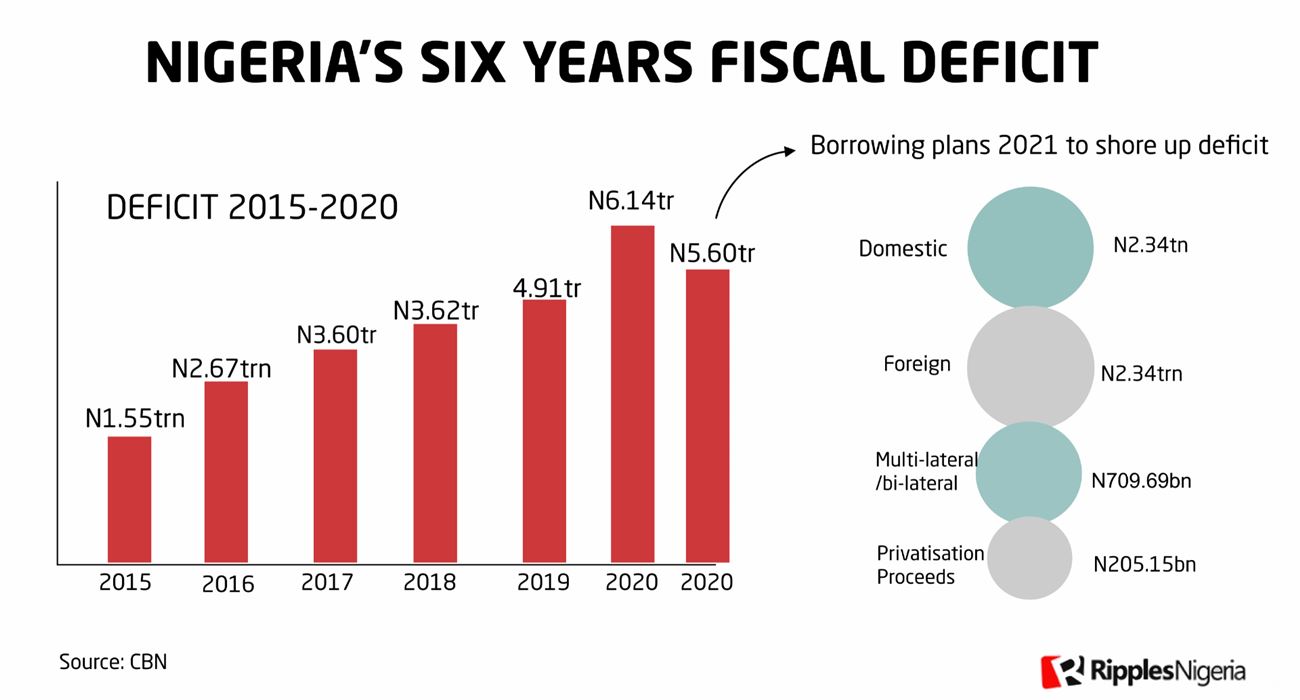News
RipplesMetrics: In six years, Nigerian govt accumulates N22.5trn fiscal deficit

From 2015 to 2020, the Federal government of Nigeria under the administration of President Muhammadu Buhari accumulated over N22.52 trillion in fiscal deficits. This is according to data obtained from the Central Bank of Nigeria and analysed by Ripples Nigeria.
Fiscal deficit refers to the excess of expenditure over revenue of the government.
During the period under review, Nigeria’s retained revenue was N22.38trillion compared to an estimated N44.1 trillion spent.
In 2015, Nigeria’s fiscal deficit was N1.55 trillion, increasing to N2.67 trillion in 2016.
In 2017, the fiscal deficit figure increased to N3.60 trillion, while in 2018 deficit increased to N3.62 trillion before hitting N4.91 trillion in 2019.
In 2020, Nigeria’s approved budget had a budget deficit of N4.60 trillion but by the end of the year, it had hit N6.14 trillion.
For 2021, the federal government overall fiscal deficit is N5.60trillion. When compared with the global figures for 2009-2014, data from the Central Bank of Nigeria show the total budgeted revenue was N20.7 trillion, total budgeted expenditure was N26.7 trillion while the total estimated deficit was around N6 trillion.
More interesting is that during the period of 2009-2015, the N6 trillion deficits created an economic growth of around 6.4 percent, while 2015 and 2019 of over N12 trillion deficits delivered the economic growth of just 1.24 percent.
In 2015, Nigeria’s economy expanded by 2.6 percent before declining to 1.6 percent in 2016 in Nigeria’s first recession in a democratic administration.
The economy re-entered a growth phase between 2017 and 2019, expanding by 0.8 percent in 2017, 1.9 percent in 2018 and 2.2 percent in 2019.
Read also: RipplesMetrics: Nigeria’s six years non-oil income at a glance
Although the GDP for 2020 is yet to be revealed, the federal government has a forecast of 4.3 percent decline.
Ripples Nigeria had reported that in 2020, for every N100 Nigeria, earned the country spent N82 servicing its debt, a clear explanation of why the country is experiencing a yearly deficit.
The situation looks unlikely to improve considering that the N13.6 trillion spending plans for 2021 also has a fiscal deficit of N5.6 trillion and an economic growth projection of 3 percent.
In her presentation on budget spending in 2020, the Minister of Finance, Budget and National Planning, Zainab Ahmed, revealed that the federal government recorded N6.1 trillion in fiscal deficit in 2020 which is 4.3 percent of GDP above the Fiscal Responsibility Act benchmark.
The fiscal responsibility act clearly states each financial year shall not be more than the estimated aggregate revenue, plus a deficit, not exceeding three percent.
Once again, Nigeria fiscal operations for 2021 will be relying on borrowings from domestic sources (N2.34 trillion), Foreign source (N2.34 trillion), Multi-lateral /bi-lateral loan drawdowns (N709.69 billion) and Privatisation Proceeds (N205.15 billion) to shore up its revenue.
Only time will tell if the growing deficits will bring about much needed economic growth for Nigerians.
By Dave Ibemere…
Join the conversation
Support Ripples Nigeria, hold up solutions journalism
Balanced, fearless journalism driven by data comes at huge financial costs.
As a media platform, we hold leadership accountable and will not trade the right to press freedom and free speech for a piece of cake.
If you like what we do, and are ready to uphold solutions journalism, kindly donate to the Ripples Nigeria cause.
Your support would help to ensure that citizens and institutions continue to have free access to credible and reliable information for societal development.
























